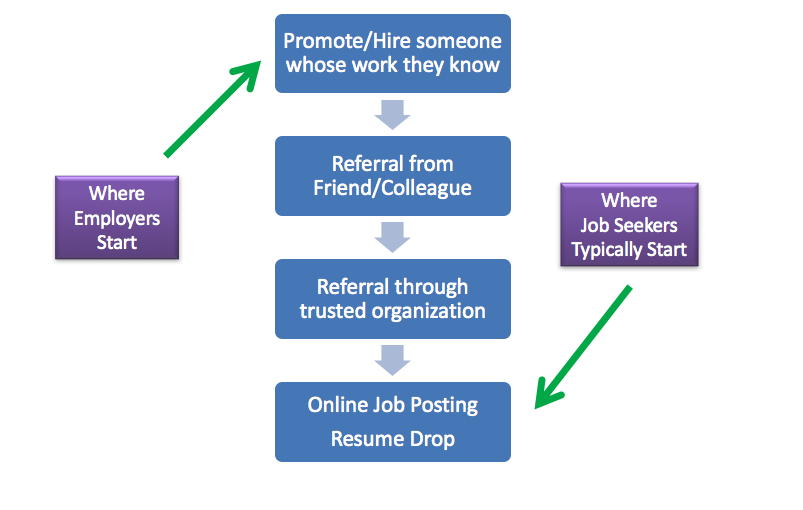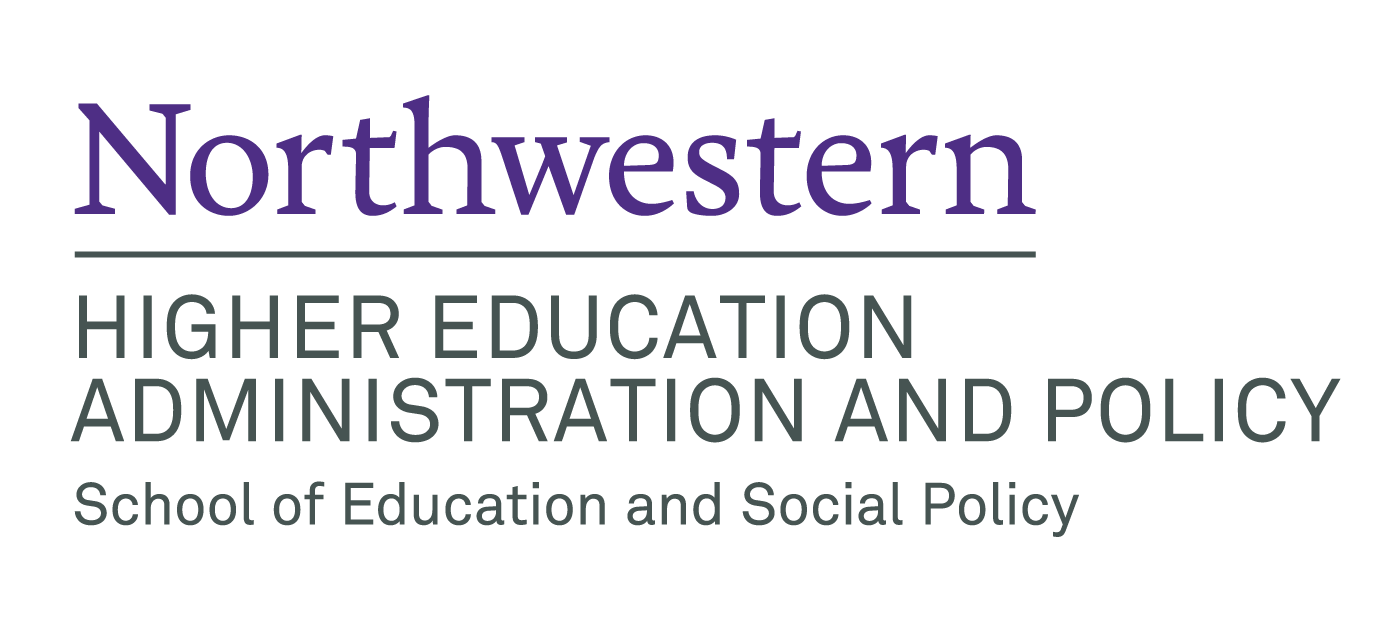Career Resources
Next workshop: Thu, Dec 8, 2016 at 6:00 pm - 8:00 pm // Abbott Hall
Networking and LinkedIn
Networking is the most important element of the job search process in higher education. MSHE staff and faculty, internship supervisor(s), and even your peers can help to connect you with people. MSHE has a powerful alumni network and connections with higher education professionals that can help you to discover what types of positions and institutions are the best fit for you, find a job, and continue to progress in your career.
About Networking and LinkedIn
Networking is sharing purposeful information about yourself: experiences, accomplishments, and career interests. It’s developing mutually beneficial relationships to exchange information, ideas, support, and resources. And it’s a powerful strategy to seek employment and to tap into the hidden job market. For example, 50-75% of Northwestern students report finding their jobs/internships through networking on annual graduation surveys and 29% of recent graduates reported that they wish they had spent more time networking while in college.
Relationship Building for Career Success
or… How to Make the Most of Networking Night in Chicago!
“The opposite of networking is not working.” This anonymous quote, by someone smart, drives home the importance of networking, and it’s the reason we’ve created this resource.
Networking is crucial to the job search and career advancement, and yet too many people avoid it like the plague. One reason is that they think of networking as slimy, underhanded, or disingenuous. When done well, though, it’s anything but!
“Networking is the exchange of information among individuals…specifically: the cultivation of productive relationships.”
~Merriam-Webster Dictionary
I love the above definition of networking, and I’ve bolded why. First – it’s an exchange of information. It’s not a needy, greedy endeavor; it’s a two-way street!
Next – it’s a cultivation of productive relationships. Cultivation evokes the idea that networking takes time, care, diligence, and purpose. That might be another reason people avoid it; we often think it’s too much work. Humans are relational beings, though. We’re building up or tearing down relationships all the time through our actions and inaction; networking simply focuses our attention and encourages us to choose actions that lead to mutually beneficial relationships.
Change your Networking Mindset
| From: | To: | |
|---|---|---|
| Networking (Slimy, fake, desperate connotations) |  |
Authentic relationship building |
| Be impressive |  |
Be interested and interesting |
| Elevator speech |  |
Strategic questions and information sharing |
| What’s in it for me? |  |
How can we help each other? |
| Quantity of contacts/whom you know |  |
Quality of relationships/Emotional bank account |
| A job-searching activity |  |
A career-long skill |
Networking’s Role in the Job Search/Hiring Process
Researchers estimate that 80 percent of All Jobs are Found Through Networking. Jobs frequently aren’t posted on job sites or are posted after a leading candidate has been identified.
To find your next dream job, you have to get out there and talk to people so that you can hear about openings early. Also, after seeing a posting, talk to people before you apply. You’ll improve your application materials and increase the chance of being a referral, rather than simply an applicant.

“The currency of real networking is not greed, but generosity.”
~Keith Ferrazi
How to Network in the Room
Even when you understand its value, networking can be intimidating. How do you get started? What do you do in a big room of people? How do you make a deep and meaningful relationship after the event is all over? Follow these tips to guide you in this process:
Before the Event
- Set a goal. It can (and should!) be simple.
Examples: I would like to…- …learn more about academic advising.
- …meet two people working in the areas of higher ed that interest me.
- …meet someone from X institution (or someone who knows someone at X institution!).
- …identify one resource for learning more about financial aid.
- Plan an introduction (e.g., I’m a higher ed professional with experience in X, and I’m really interested in Y) and opening question.
- Do some quick research. Scan the Chronicle of Higher Education, Inside Higher Ed, or news on the institutions of interest to you. You don’t have to be an expert, but knowing some headlines never hurts.
During the Event
When it comes to actually networking during the event, start by reading the room to look for nonverbal cues. Take a look at the example below and consider with whom you would start a conversation. (Click on each point below to see if you align with our suggestions!)
Activity adapted from The Smartest Ways to Network at a Party
Think about purposeful conversation starters:
- What prompted you to attend this event?
- What was the best idea you heard from today’s talk?
- What are you working on right now, and what role does [event topic] play in your work?
- Thank you so much for your comments. I enjoyed [specific detail]. How did acquire your knowledge in this area?
- I appreciated your comment/question about [topic]. What prompted you to share it?
- I’m interested in learning more about [topic]. What resources and advice do you recommend?
- I’m a higher ed professional committed to professional advancement. What tools and strategies have you found helpful for your own professional growth?
Also, think about polite transitions. Networking events can be tricky. For some, the goal is to meet just one person and have an in-depth conversation, and for others, the goal is to meet several people. If you’re having a good conversation, but need to move on in order to accomplish your goals, here are some polite exit strategies:
- “Please excuse me; I’m going to [get some more food, use the restroom]. It was great to meet you!”
- “It is so nice talking with you. Would you mind if I connect with you on LinkedIn so we can continue the conversation?”
- “Thanks so much for talking with me. I’m going to [mingle a bit more/say hi to a friend], but I hope we can chat again later.”
- “Knowing that you’re interested in ____, let me introduce you to _______, who would also enjoy talking with you.”
- “Do you know anyone else here that knows about [topic]? Would you mind introducing us, please?”
After the Event
Think about ways to maintain and deepen the relationship.
- Write a thank you email or note. (This is a must!) See examples.
- Send a note and a connection request on LinkedIn. Endorse their skills, if applicable (e.g., If you like Dr. Murphy’s presentation, let him know!).
- Send an article or another resource relevant to your conversation.
- See an event or job description that might interest your new contact? Pass it along!
- Did you get a great tip that you followed, with positive results? Let your contact know! People love to hear that their advice mattered and led to good things.
- Did you meet someone who contributed to (or might benefit from) your Master’s Project or a work project you’re doing? Share updates on your progress, and let them know when you’ve finished, too!
- If, after the event, you think of someone who could be helpful to your new contact, e-introduce the two of them.
- Stay in touch. Use LinkedIn “relationship reminders” to reach out regularly.
Remember to also reflect on your own experiences. Go back to the goals you (should have) set before the event:
- Write down your original goal(s).
- Reflect upon whether you accomplished your goal(s). To what extent do you think you accomplished your goal(s) and why?
- Who did you meet, and what did you learn?
- What, if anything, would you do the same or differently at networking events in the future?
- Record your responses to #1-#4 on a Word document and submit it as an assignment on Canvas as part of the mini-badge requirement.
More Resources
The Smartest Ways to Network at a Party
Attending a Conference as an Introvert
Mastering the Art of the Informational Interview
You Can’t Get a Job by Applying for It
Is your LinkedIn Profile ready for Higher Ed?
